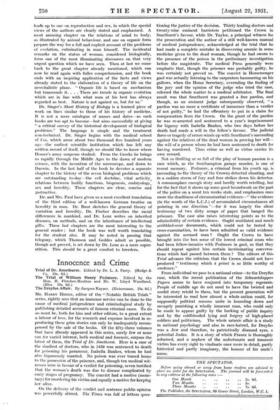Innocence and Crime
The Trial of William Henry Podmore. Edited by the Hon. H. Fletcher-Moulton and Mr. W. Lloyd Woodland. (Bles. 10s. 6d.)
The Dreyfus Affair. By Jacques Kayser. (Heinemann. 10s. 6d.)
MR. HARRY HODGE, editor of the " Notable British Trials " series, rightly sees that an immense service can be done to the cause of medical jurisprudence and criminological study by publishing detailed accounts of famous criminal cases. To do so must be, both for him and other editors, to a great extent a labOur of love, for the research and expense involved in re- producing these grim stories can only be inadequately recom- pensed by the sale of the books. Of the fifty-three volumes that have already appeared in this series, surely few or none can for varied interest, both medical and forensic, surpass the latest of them, the Trial of Dr. Smethurst. Here is a case of the shadiest of doctors, who in 1859 was sentenced to death for poisoning his paramour, Isabella Bankes, whom he had also bigamously married. No poison was ever traced home to the possession of the prisoner, and, though ten medical wit"- nesses were in favour of a verdict for poisoning, seven testified that the woman's death was due to disease complicated by early stages of pregnancy. The convict had a motive (mone tary) for murdering his victim and equally a motive for keeping her" alive.
On the delivery of the verdict and sentence public opiniOn was powerfully stirred. The Times was full of letters ques-
tioning the justice of the decision. Thirty leading doctors and twenty-nine eminent barristers petitioned the Crown in Smethurst's favour, while Dr. Taylor, a principal witness for the prosecution and the author of a still well-known manual of medical jurisprudence, acknowledged at the trial that he had made a complete mistake in discovering arsenic in some medicine given to the dead woman, though' he had sworn to the presence of the poison in the preliminary investigation before the magistrate. The medical Press generally were emphatic that, though the prisoner was probably guilty, he was certainly not proved so. The- convict in Horsemonger gaol was actually listening to the carpenters hammering on his gallows, when the Home Seeretary, overruling the finding of the jury and the opinion of the judge who tried the case, referred the whole matter to a medical arbitrator. The final result was that Smethurst was granted a free pardon, and though, as an eminent judge subsequently observed, " a pardon was no more a certificate of innocence than a verdict of not guilty," he had the effrontery to put in a claim for compensation from the Crown. On the grant of the pardon he was re-arrested and sentenced to a year's imprisonment for bigamy with Isabella Bankes, who two days before her death had made a will in the fellow's favour. The judicial farce or tragedy of errors winds up with Smethurst's succeeding against the relatives of the dead woman in proving her will— the will of a person whom he had been sentenced to death for having murdered. Thus crime as well as virtue carries its own reward.
Not so thrilling or so full of the play of human passion is a case which, as the Southampton garage murder, is one of recent memory. Podmore, a criminal from his youth up, is (according to the theory of the Crown) detected cheating, and in a sudden storm of fury and fear strikes down his detector. A commonplace enough story and hardly worth retelling, but for the fact that it shows up some good houndwork on the part of the police on a scent ten weeks stale, and emphasizes once more the deadliness of circumstantial evidence—" the evidence (in the words of the L.C.J.) of accumulated circumstances all pointing in one direction "—for it was largely the silent testimony of two dirty scraps of paper that hanged the prisoner. The case also raises interesting points as to the admissibility of certain evidence. Ought mutilated and much scribbled-over documents, which could not be tested by cross-examination, to have been admitted as valid evidence against the accused man ? Ought the Crown to have brought into the box some of the lowest criminal scum who had been fellow-inmates with Podmore in gaol, so that they should repeat against him certain incriminating conversa- tions which had passed between them ? The editors of this Trial advance the criticism that the Crown should not have produced " testimony which a priori is so little worthy of credence."
From individual we pass to a national crime—to the Dreyfus case, which the recent publication of the Schwartzkoppen Papers seems to have conjured into temporary regenesis. People of middle age do not need to have the twisted and sordid story retold to them, but the present generation will be interested to read how almost a whole nation could, for supposedly political reasons unite in hounding down and savagely punishing a wholly innocent man, who could only be made to appear guilty by the burking of public inquiry and by the coldblooded lying and forgery of high-placed soldiers and politicians. The whole satanic affair, is a study in national psychology and also in race-hatred, for Dreyfus was a Jew and therefore, to patriotically diseased eyes, a potential Judas. It is a story ,of which France is thoroughly ashamed, and a nephew of the unfortunate and innocent victim has every right to vindicate once more in detail, partly historical and partly imaginary, the honour of his uncle's name.






























 Previous page
Previous page